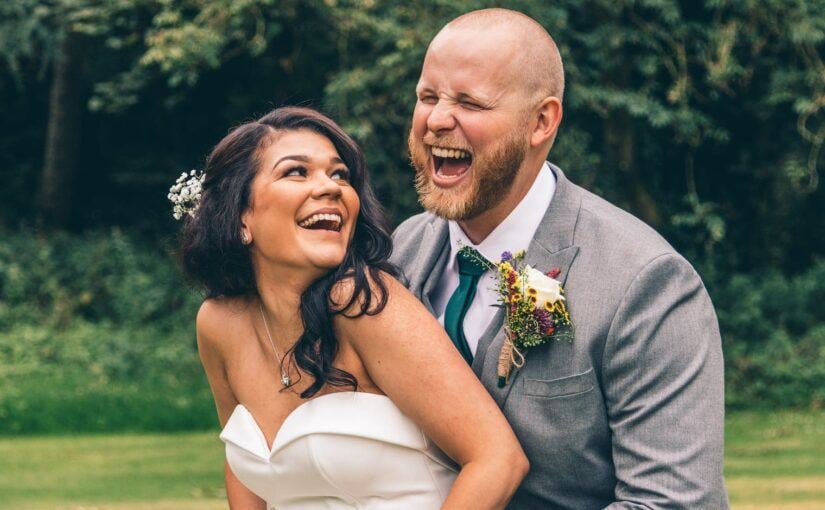Hiring a photographer is one of the few non-negotiables that couples have when it comes to their wedding. A photographer will spend time capturing moments that you’ll look back on for the rest of your lives, so it’s worth dedicating a portion of your budget to a skilled professional.
That skill naturally often comes with a fairly hefty price tag. In the UK, couples spend an average of £1,300 – £1,500 on a wedding photographer, which is a decent chunk of the average overall budget for a wedding at £20,775.
But what if you don’t want to spend that much on a photographer, or you simply don’t have the budget to spare? Does that mean you have to forgo beautifully-taken professional photos and rely on what your guests capture on their phones?
Thankfully, the answer is a resounding no. Even on a tight budget, there are ways around having to pay even close to the UK average for a photographer. In this post, we’re going to dive into the many tips and tricks you can use to save money on a wedding photographer and still have a wonderful wedding album that you can treasure forever.
Why are wedding photographers so expensive?
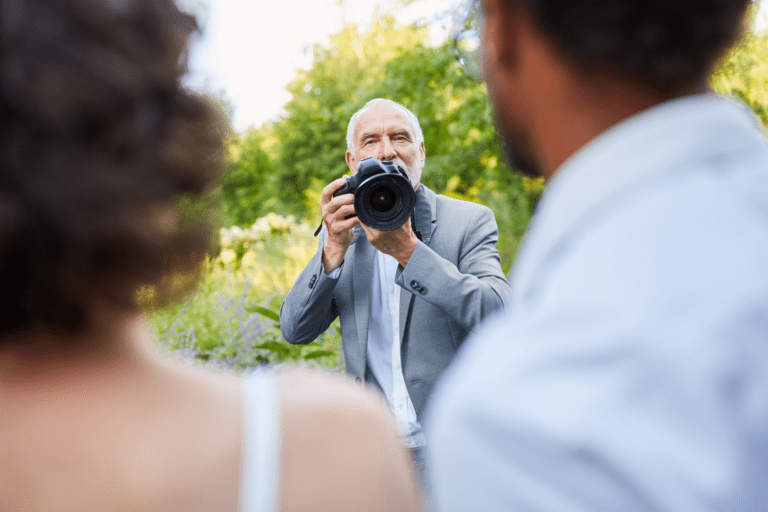
You might be wondering how wedding photography can cost £1,500 or more on average. Well, a lot of time, money, experience and effort goes into the production of a wedding album – more than you probably realise at first glance. The cost will include:
- The years of training and experience behind them
- Their knowledge and expertise
- Their expensive equipment (including what they need for post-production)
- Their time before, during and after the big day
- Travel and other business expenses
- Post-production and editing costs
- Print release/copyright of your photographs (you’ll need to check with your photographer which is included – see below)
So, while you may spend a relatively short amount of time with your photographer on the day itself, the monumental amount of work they do behind the scenes contributes heavily towards the cost.
12 ways to save money on a wedding photographer
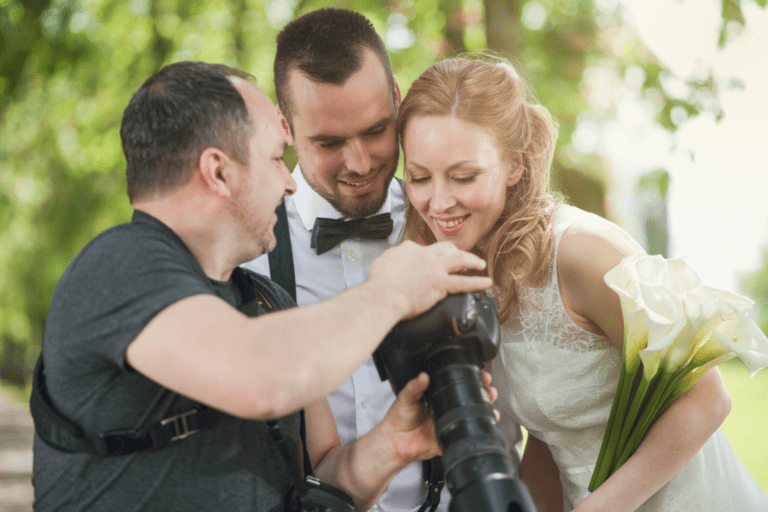
The good news is, there are plenty of ways you can significantly lower how much you pay for a photographer at your wedding. Below are 12 ways you can pay less but still have fabulous photographs of your special day.
1. Hire them using their hourly rate instead of a flat rate
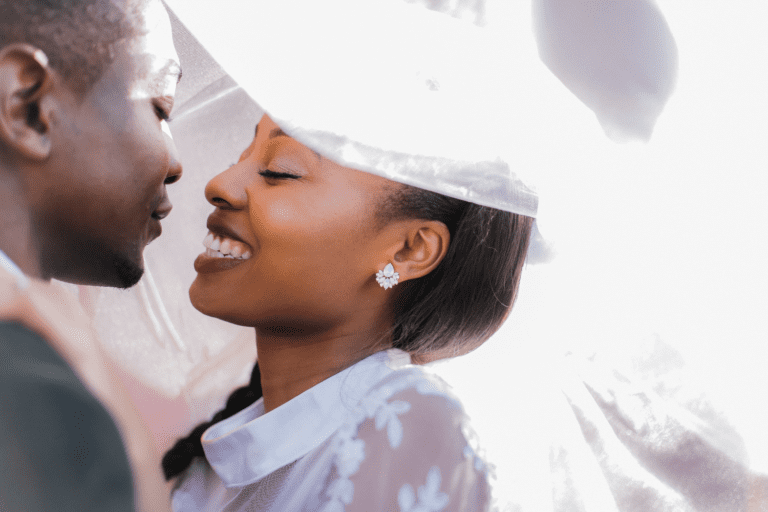
All wedding photographers tend to advertise a flat rate, which will normally be a certain number of hours at a set fee. You can save money by asking them for their hourly rate and hiring them for fewer hours. Of course, you’ll want them there to capture the ceremony and then photos of you and your new spouse, plus your family and friends, but you could really cut how much you spend by forgoing photos of the breakfast, speeches and the evening reception. An added bonus is that if you hire a photographer for fewer hours, it’ll also help you to be more organised and avoid any time-consuming faff.
2. Choose a basic package

Photographers tend to offer set bundles or packages, which will normally involve an album and a certain amount of printed images. Settle for the basic package and then get creative by putting together your own wedding album, when you can spread the cost out during the months following your wedding. There are plenty of affordable albums available, which you can personalise with a little creative craftwork.
For example, Jacque Prates Photography in Derbyshire offers a basic ‘Fun Package’ which includes four to six hours of photography with prices starting from as little as £70 per hour.
3. Ask for photographer recommendations (which could lead to a discount)

Find out if your desired photographer will offer a discount based on a referral. Word of mouth dominates the wedding industry, so this is often the case with a lot of professional photographers. Always mention who it was who referred you in the first place. Remember, the worst they can say is no, but chances are they’ll be able to offer you something. Even a small saving, like 5%, will help when you have so many different vendors and services to pay for.
You can also browse our wonderful selection of wedding photographers and filter by exclusive Bridebook special offers to find discounts you won’t find anywhere else.
4. Opt only for digital copies of your photographs
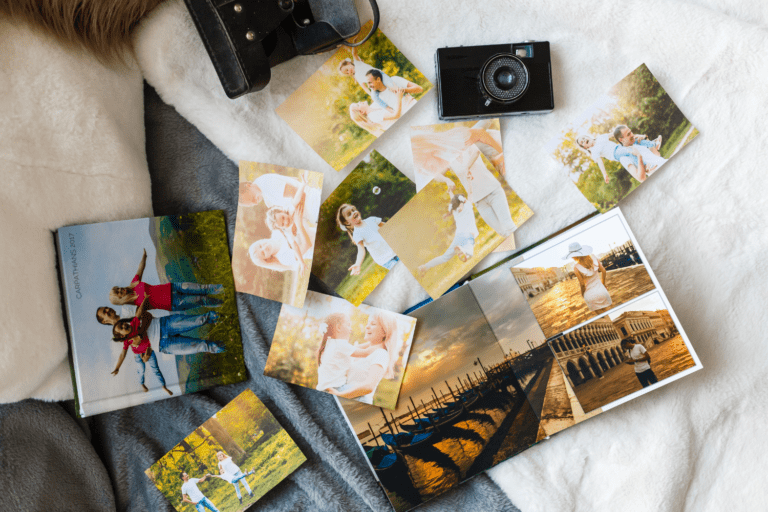
It’s the 21st century, and if you think about it, when was the last time you had actual physical photographs printed? Gone are the days of having to develop photos as the only option, with most of us having years’ worth of photos right there on our smartphones. If you’re on a tight budget, it’s not unreasonable to consider doing the same with your wedding photos? Then, you could have just one or two printed to frame and hang on the wall, and skip the physical album altogether to save hundreds.
On this note, though, there are several important points to be aware of. If you hire a professional photographer, but ask only for digital photos, when you take those images down to your instant local photo lab, what you get back might not be not what you imagined or even saw on your screen.
A professional photographer does more than send your photos out for printing to make it into a great print that can last a lifetime. This includes:
- Retouching the final image, including the people and the background
- Using calibrated monitor to make sure everything is true to life (including the colours, brightness, contrast and vibrancy)
- Properly cropping the picture to fit the frame
- Resizing the image based upon the desired dimensions
- Sharpening the image for the printer depending on the surface it will be printed on (whether paper, wood or even metal)
- Working with professional colour labs (to make sure the colour reproduction is true)
- Choosing the right high-quality paper for the image
Read more on why your photographer should print your images here. The point is, if you’re trying to save money and want to print your wedding photos yourself, there are potential consequences and risks to consider.
5. Secure a print release rather than complete copyright
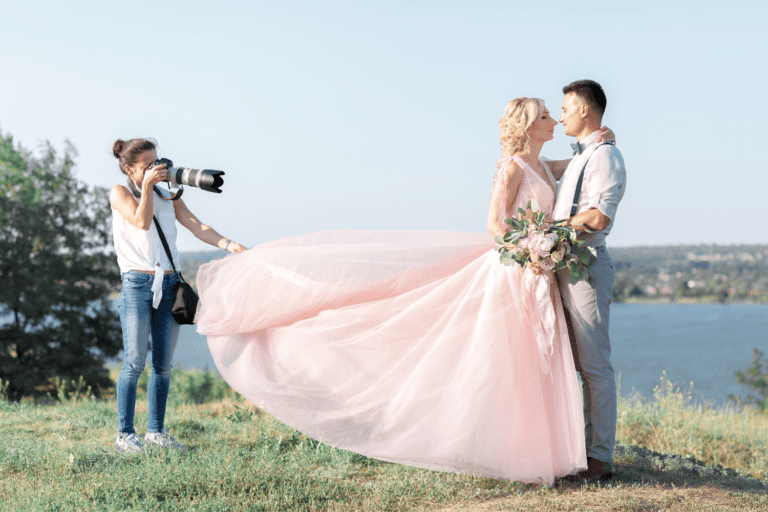
When choosing your wedding photographer, be sure to discuss the type of release they offer (complete copyright, vs a personal use/printing release) and how it aligns with your budget and needs. This clarity will help you plan your wedding budget effectively and nurture a positive and transparent relationship with your photographer.
If you’re budget-conscious, a personal use/printing release is more than enough to meet your wedding photo needs. It allows you to enjoy your photos without the added expense of purchasing complete copyright, which can be costly on top of the shooting fee. Some photographers may also offer high-quality prints and albums as an alternative, but this can be more expensive. Whichever option you choose, it’s always good practice to credit your photographer when sharing photos on social media – especially if the images aren’t watermarked – as a sign of appreciation for their work.
6. Book your photographer early (and in some cases…late)
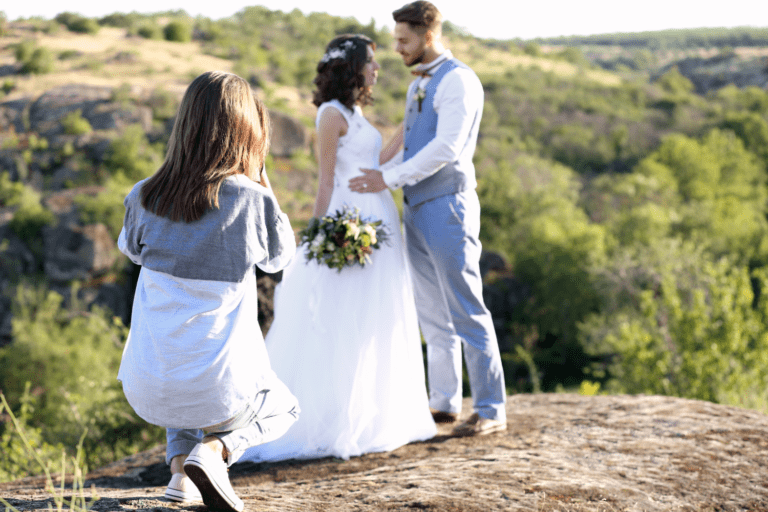
Book as soon as you possibly can. Photographers will often have a discount for advanced bookings, which you can definitely utilise. Plus, if you wait until fairly close to the big day, photographers will know you’ll have very few options, which means you might have to pay higher-than-usual rates.
On the flip side, the opposite can also save you money, with many photographers offering great last-minute deals. Browse our range of photographers and filter by Bridebook special offers to view late availability. If you’re brave enough, this could save you as much as 30%. Of course, it doesn’t always guarantee that you’ll be able to find your number one choice, but it could be worth the risk.
7. Ask an aspiring photographer in your family to do the honours
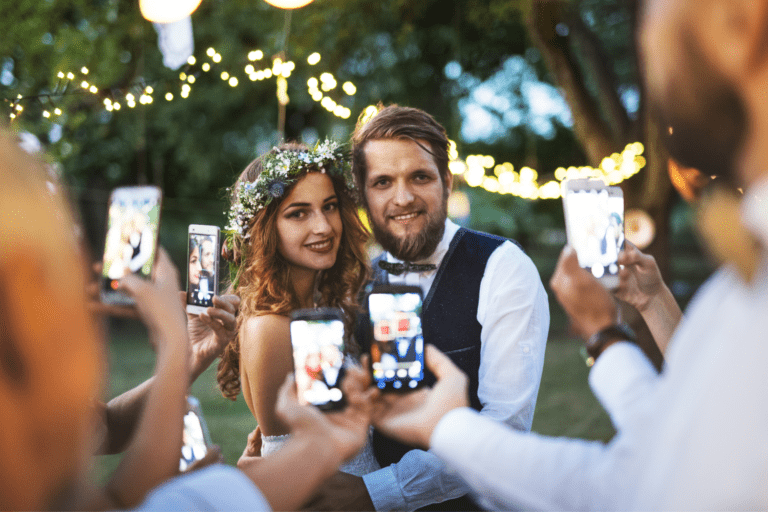
Do you have a cousin studying photography at college or an uncle who once won a photography award? Ask them to snap some photos during the day and into the night so you don’t have to rely on paying a professional for more hours than you’d like to. You may not want to rely on an amateur photographer to take your official wedding photos, but whatever they capture should be able to complement them perfectly.
8. Hire a local photographer
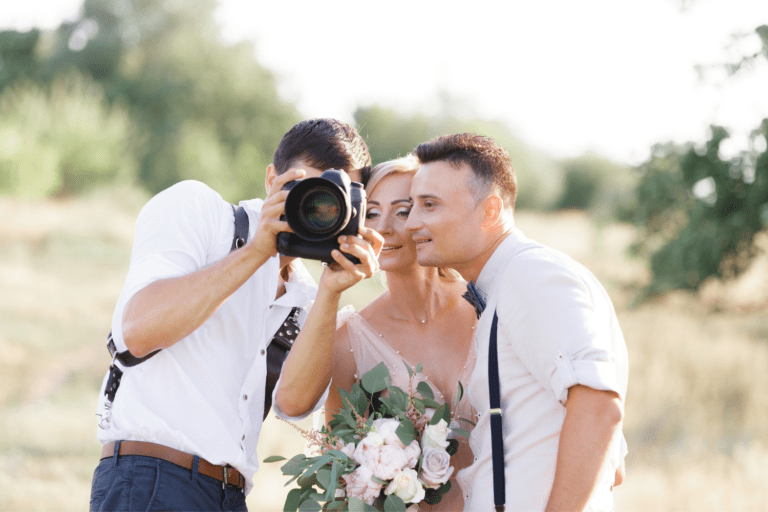
The photographer you hire will more than likely have a catchment area. If your wedding venue is outside of this area, you’ll have to pay additional travel (and maybe even accommodation) expenses, which can soon add up. Try to hire a photographer who has a catchment area that includes your venue so they don’t have to travel too far.
The only exception to this might be if you’re hiring a photographer who is based in London. London-based photographers tend to have higher rates than those outside the capital, so try to bear this in mind. Get some quotes and weigh up which is more in keeping with your budget.
Check out our huge range of photographers across the UK to find one close to you.
9. Hire a photographer with less experience
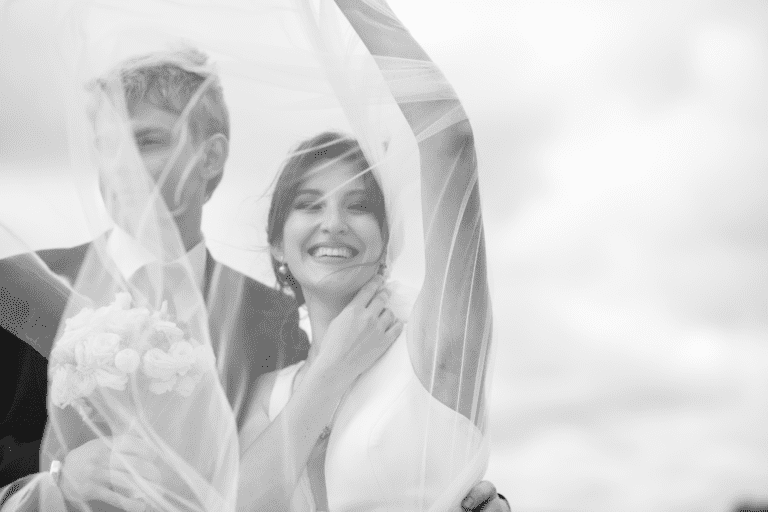
When you hire a photographer, you’ll want to have confidence that they’ll be able to take perfect photos and have a full understanding of composition, lighting, framing and how to direct people, to capture the best photographs possible. A photographer with years of experience will be able to do this without any issues, but that experience comes at a cost.
A less experienced photographer will still be finding their feet, but they’ll have the developing skill, knowledge and understanding they need to still take brilliant photos. They just might be a little less confident and nervous. If you’re willing to take the risk, hiring an up-and-coming photographer is a great way to save hundreds of pounds.
10. Try to avoid having your wedding during peak times
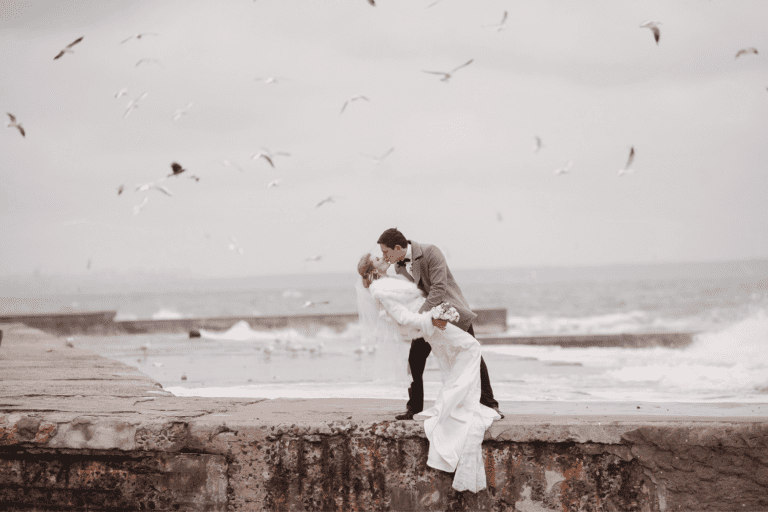
The most popular time to get married is between April and September, and on weekends, which means professional photographers will always have higher rates during these times. The same applies to practically every supplier you’ll hire to be a part of your big day.
That means, if you get married outside of peak dates, you’ll pay less – way less. It might not be super convenient for you or your guests, but having the confidence to ask your guests to take a day of annual leave can save you an absolute ton of money – not just on your photographer, but on many other parts of your wedding, too.
January and February tend to be the cheapests month for a wedding, so if you don’t feel the cold, either of these months could be a great time to book your photographer. And on the off-chance there’s frost or snow, it’ll give you the opportunity to take unique wedding photos.
When browsing for photographers here on Bridebook, check out their seasonal offers to see what brilliant discounts they can offer when your wedding is during quieter times. Many give out amazing discounts on winter weddings in particular.
11. Ask your photographer not to use an assistant
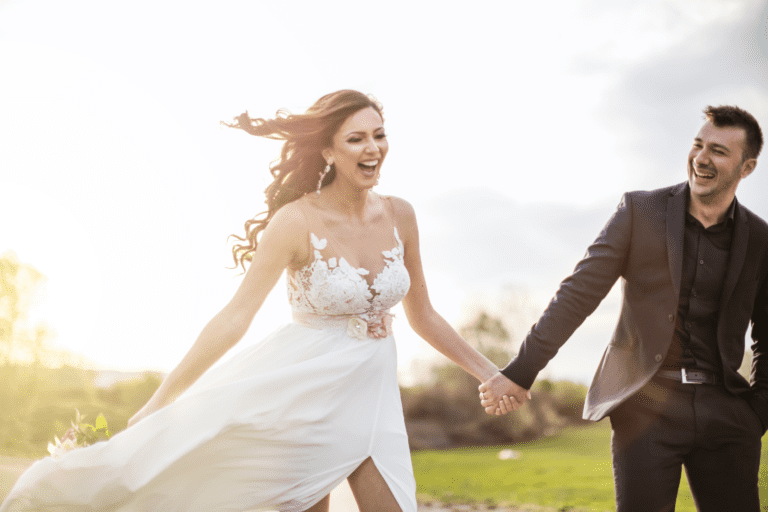
Sometimes, your chosen photographer will employ an assistant to work at your wedding to provide photographs from a variety of angles. While their assistant won’t be as experienced as them and will be an up-and-coming photographer who is still learning their craft, they can still add a hefty amount to the cost. Ask your photographer to work alone – and lower the cost at the same time.
12. Only shoot photos during and after the ceremony
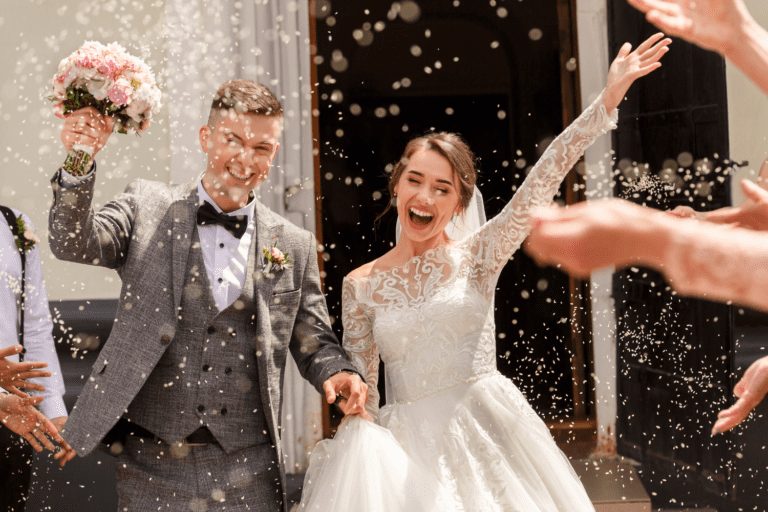
Your wedding ceremony will only take around half an hour, so why not hire a photographer to only shoot the ceremony and then a few post-ceremony photos with close family? That way, they should only have to be at your wedding for a maximum of 90 minutes, but you’ll still have professional photos to remember the big day by. Even when photographers offer set packages, they’ll usually be open to working to your requirements if you’re after something bespoke.
Plan your dream wedding with Bridebook
At Bridebook, we have all the tools, tips and industry insights you could possibly need when planning your wedding. Sign up today and start saving money!
Browse other similar articles:
- How Much Does Wedding Photography Cost? The 2024 Average Revealed
- The Ultimate Wedding Budget Breakdown
- How Much Does a Wedding Cost? The 2024 UK Average
- Introduction: Your Wedding Budget
- Hidden Wedding Costs Every Couple Needs To Know About
- Wedding Etiquette: Who (Traditionally) Pays For What?
